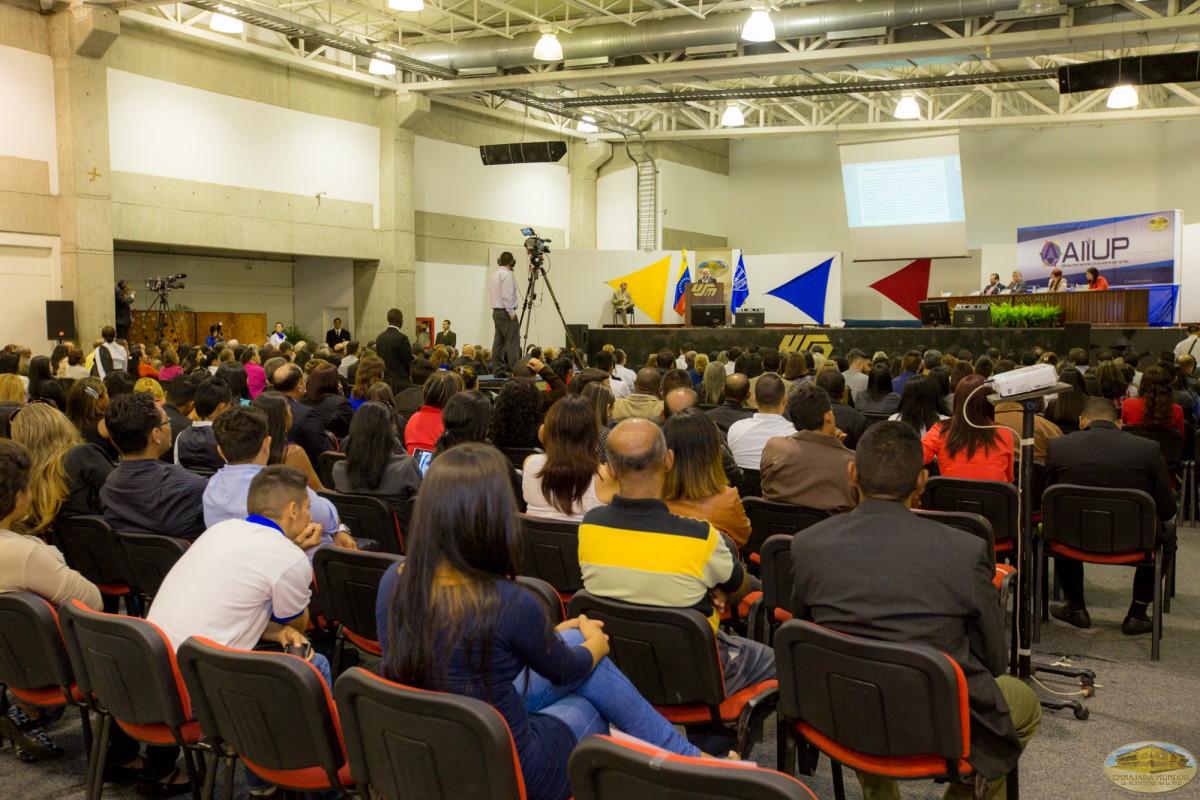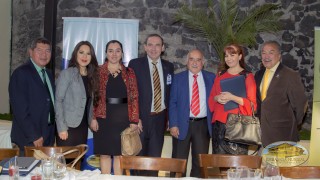The proposals will be discussed at the Peace Integration Summit
With the objective of building a culture of peace through education, the International Alliance of Universities for Peace (ALIUP) continues to develop academic assemblies in various countries for the preparation of collaborative proposals for plans, programs and projects to enrich higher education, this time in Venezuela with the IV International Seminar - Challenges of Higher Education in Human Development and Society.
The Great Hall of the University of Santa Maria of the capital city, brought together leaders of institutions of higher education, university professors, state authorities, international leaders, youth leaders, activists for peace, and other citizens, to discuss the theme “Values in the Development of Professional Competences”.
Present at this academic gathering, organized by Dr. William Soto – Global Ambassador of the GEAP and President of ALIUP – were the Ambassador of Paraguay to Venezuela, Dr. Enrique Ojara Campos; the Honorable Senator of the Republic of Paraguay, Dr. Blanca Fonseca; Dr. Luis Antonio Ortiz, Magistrate of the Supreme Court of Justice of the Bolivarian Republic of Venezuela; Ambassador Dr. Julio César Pineda; Dr. Luci Bento, Director of Graduate Studies of the Nihon Gakko University (Paraguay) and Interim Secretary of ALIUP, among other personalities who joined this international project.
The proposals of the series of international seminars developed in different countries of Latin America will be discussed at the Peace Integration Summit (CUMIPAZ), to be held in Santiago de Chile on November 6th of this year, and will be taken into consideration by the divisions committed to higher education.
Academic Gathering for a Higher Education that Promotes a Culture of Peace
In her introductory words to the Seminar, Gabriela Lara, General Director of the GEAP, spoke about some of the projects and programs promoted by the organization, focused on the education and preparation of citizen consciousness of the integral human being and the peoples of the world; among them: “21st Century Education for the Peace of the Integral Human Being and the Nations” (ES21P) – project that establishes an integral and holistic educational system for the full development of the human being; and the educational program “Educate to Remember” – which promotes education in schools and universities based on the teaching and promotion of human rights.
“Throughout this effort we have been able to see that the human being has the need to achieve peace; and we know that universities play a fundamental role in the teaching and transmitting of values that allows a human being, beyond preparing himself as an excellent professional, to be a person of integrity and be human,” she said.
With this in mind, she invited all institutions, academic authorities, teachers and other citizens present to join this Alliance of Universities, ALIUP, that not only works in Latin America, but also with important projects in the United States and Spain.
For his part, the Vice Rector of the University of Santa María, Dr. Carlos Enrique Peña, was grateful for the opportunity to host the seminar and also added:
“I believe that the promotion of a culture for peace is a mandate of the people and should be conceived, but in an integral way, from the formation of the child through university level in a continuous and permanent way, to achieve reaffirmation and fortification of the objective that the people of the world pursue: peace and not war.”
In addition, he formally proposed the integration of this maximum house of studies to the Global Embassy of Activists for Peace (GEAP).
With regards to the constitution of this International Alliance, Dr. Luci Bento, Interim Secretary of ALIUP and Director of Graduate Studies at the Nihon Gakko University (Paraguay) – an institution that is part of the founding members of ALIUP – explained that the judicial fora organized by GEAP, as well as the programs and projects promoted by Dr. Soto, are a source of inspiration for this International Alliance. She also mentioned that Venezuela had active participation in the development of ALIUP.
“In such a short amount of time, ALIUP has had an international impact at the Latin American level, as well as at the Second Academic Summit of Latin America, the Caribbean and the European Union held at the bi-regional gathering with the leaders in Brussels. The actions taken demonstrate that ALIUP works in coherence with one of the objectives of Higher Education: the internationalization of education,” she said.
Proposal for an Integral Educational Model for the Triune Human Being
Dr. William Soto argued for the transcendental role of education in the formation of the personality of the individual, which he indicated is a factor in the consolidation of respect for human rights, and consequently in the construction of peace; this referring to the United Nations (UN) and the Universal Declaration of Human Rights (Article 26, numeral 2), international instruments that typify this conception.
In turn, he presented an integral and holistic educational model for the formation of the human being in consideration of his composition as a triune being – soul, spirit, and body:
“It is urgent and necessary to include an education plan for peace in universities, which recognizes the complete nature of the human being, because we have forgotten that the person is not only a physical body, it is also formed by spirit and heart (or as many call it, soul). It is important to understand that the human being is integral and that each of these components has information, knowledge, a message or a word that must be received that will help form him, and a different process that strengthens him.”
As for the spirit, he explained, “The spirit is located in the mind of the human being, it is the conscious part, it is the part of the human being that can be educated, where we develop intelligence. Through the spirit, we acquire knowledge, skills, and abilities, and it is precisely in the spirit where universities work.”
In relation to the heart, he pointed out, “It is the heart that decides with freedom of choice, what information it will discard, or accept, and project through actions. That is why today we speak so much about the education of the heart. The heart gives orders to the mind. This information has been fully substantiated, thanks to extensive research in this field”. (Read complete speech).
Based on the above, Dr. Soto expressed the need for integral education, which not only trains professionals, but also human beings who, from their professions, can contribute to the formation of a culture of peace; with the understanding that the founding in values appears as a clear demand from society to higher education.
Knowing Human Rights to Build Peace
The Senator of Paraguay, Dr. Blanca Fonseca, who has had continuous participation in the series of ALIUP seminaries, spoke on the importance of Human Rights Education; she also presented the projects she leads in this regard, among those mentioned was a draft law whose purpose is to include in the educational curriculum as a whole, teaching as a subject of human rights.
“Human Rights are the essential piece for democratic coexistence (...) Day after day we work together to build a culture of peace through quality education that is oriented towards the development of professional skills, based on respect for dignity and the protection and promotion of human rights,” she said.
Only Those Who Know Their Rights Can Demand Them
Following the proposals, Dr. Eduardo Torres, representative of the Center for Peace and Human Rights, linked to the Central University of Venezuela, expressed his commitment to the development of ALIUP projects, and in his speech he spoke about “The Promotion of Legal Instruments in the Culture of Peace and Human Rights for the Respect of Human Dignity”; in this sense he referred to the Universal Declaration of Human Rights and the Constitutions of each country.
“To educate for dignity by relying on international and national instruments of human rights and culture of peace (...) Within the legal instruments are concepts, values that have been collected by men and have been recognized; but, on the other hand, there are the rules that form the basis for enforceability. That is to say, to the extent that we have educated citizens, citizens who know what their rights are, they can then demand them and can respect them,” he said.
From Subject to Victim: Reconstruction of the Psychosocial Tissue
“I did not come here to contradict. I came to take away a better method to continue educating,” were the words of Dr. Diana Esther Salgado Ruiz, professor of the University Psychology Program of the Cooperative University of Colombia, who through her experience working with victims of armed conflict in that nation, developed the theme “From Subject to Victim, Reconstruction of the Psychosocial Fabric”, and presented the actions of this house of studies with regards to the theme of peace.
With regards to this, she spoke about her article, “Compensation for Pain and Subjectivities of Trauma”, a reflection that emerges from working with victims, as a way of saying that pain is not compensated with anything.
Also, as leader of the project “Curriculum Reform Process” of the University's Psychology Program, she commented on the teams that have carried out regional seminars, individual-collective memory modules, tissue reconstruction and peace processes – which were inspired by the GEAP project “Traces to Remember”, and Dr. Soto's articles on good treatment and warning signs.
Transformational Leadership for Peace
The focus of higher education on values, based on leadership, was another theme developed in the seminar; in the words of Iris Gil, representative of the Antonio José de Sucre University Institute of Technology of Anzoátegui state, Venezuela.
“Given the situation the need to improve Higher Education and, therefore, teaching practices, emerges, humanizing work performance by incorporating characteristics that support the transformational leadership for peace, is being considered one of the key factors that can positively influence the academic dynamic, to achieve full development in the training of skills and values in students,” he said.
Youth Committed to the International Alliance of Universities for Peace
Representatives of important institutions of higher education of Venezuela also gave their contribution in relation to the role of higher education in the formation of a culture of peace.
“Universities and institutions of higher education must prepare future professionals to be able to use their knowledge, not only in the scientific, technological, or economic context, but also to apply it in the solution of broader social needs. There is the need to establish new social paradigms based on peace and coexistence, fraternity of the human being, freedom and equality, respect and recovery of our planet,” said Luis Miguel Villafañe, Alejandro Humboldt University Student Center.
“Higher education must be an important weapon, it must be nourishment for the spirit ... Through higher education we must generate transformative leadership; leaders who begin to work in the construction of a true culture of peace,” said Víctor Hugo Hidalgo, representative of the Center for Students of the Central University of Venezuela.
ALIUP Supports UN Resolution
“Education is a power; and we are aware that it is the most powerful weapon to transform mentalities. Therefore, it should be a fundamental mechanism to modify societies and, consequently, to change the world.”
Based on this thought by Dr. William Soto, ALIUP works to promote the development of professional competencies in higher education through comprehensive training, and to foster inter-institutional strategic alliances that sow, foster, and strengthen a culture of peace in society.
In this way, GEAP supports UN Resolution 53/243 on the Declaration and Programs of Action on a Culture of Peace.



